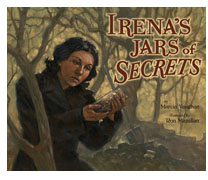Since the company was founded in 1991, diversity at LEE & LOW has been defined by ethnicity. Our focus has always been on multicultural stories that explore racial and cultural diversity, from remembering the experiences of past generations to reflecting on the world in which we live today.
For the first time in twenty-five years, our mission is expanding to include themes outside the conversation of race. Here are three new books that charted new territory for us:
Irena’s Jars of Secrets (Fall 2011)
The riveting, true story of Polish social worker Irena Sendler, who lived during World War II. Using creative means, and at great personal risk, she saved thousands of Jewish children from Hitler’s Nazis by smuggling the children out of the Warsaw Ghetto.
Why we published this story: In 1997, we published a book called Passage to Freedom: The Sugihara Story, about a Japanese diplomat who defied his government during World War II to help thousands of Jewish refugees elude the Germans. While the themes of Irena’s Jars of Secrets and Passage to Freedom are similar, acts of extreme heroism for the sake of others are rare, timeless, and worth celebrating. Another reason Irena Sendler’s story spoke to us was the chilling fact that although nearly seventy years have passed since World War II ended, crimes of genocide continue into the twenty-first century. We felt that young readers should know about Irena Sendler as someone who stood for justice and compassion in times like these, and we discovered there were no other picture books that told her story. (Note: One season before our book was published, another book on Irena was released, so now there are two picture books about her.)






